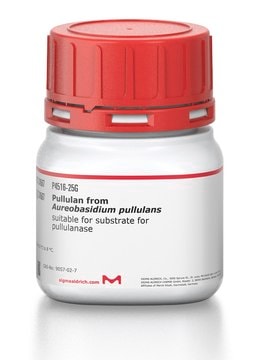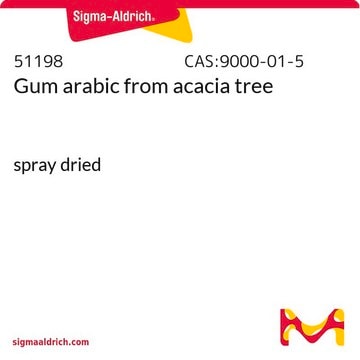G0503
Karaya gum
Synonym(s):
Gum karaya from sterculia tree, Tragacanth Indian
Sign Into View Organizational & Contract Pricing
All Photos(1)
About This Item
Recommended Products
biological source
plant fluids (Gum karaya)
Quality Level
form
powder
color
faint yellow to brown
storage temp.
room temp
Looking for similar products? Visit Product Comparison Guide
Application
Karaya gum may be used for the development of gastro intestinal tract drug delivery vehicles, mucoadhesive sustained release drug delivery and noneffervescent floating drug delivery systems in combination with alginate.
Other Notes
Believed to be a partially acetylated polymer of galactose, rhamnose, and glucuronic acid with a M.W. of approx. 9,500,000.
To gain a comprehensive understanding of our extensive range of Oligosaccharides for your research, we encourage you to visit our Carbohydrates Category page.
Storage Class Code
11 - Combustible Solids
WGK
WGK 2
Flash Point(F)
Not applicable
Flash Point(C)
Not applicable
Personal Protective Equipment
dust mask type N95 (US), Eyeshields, Gloves
Certificates of Analysis (COA)
Search for Certificates of Analysis (COA) by entering the products Lot/Batch Number. Lot and Batch Numbers can be found on a product’s label following the words ‘Lot’ or ‘Batch’.
Already Own This Product?
Find documentation for the products that you have recently purchased in the Document Library.
Customers Also Viewed
Takashi Koguchi et al.
International journal for vitamin and nutrition research. Internationale Zeitschrift fur Vitamin- und Ernahrungsforschung. Journal international de vitaminologie et de nutrition, 73(5), 369-376 (2003-12-03)
This study was performed to clarify how dietary fiber (DF) with different viscosities would be associated with dietary RNA metabolism. Male Wistar strain rats, four weeks old, were fed diets containing a 3% (w/w) yeast RNA and a 5% (w/w)
Biswajit Mukherjee et al.
Current drug delivery, 6(2), 199-207 (2009-05-20)
Toothache is a serious problem worldwide. To give relief from this intolerable toothache, doctors prescribe painkillers along with antibiotics. Most of the painkillers, if not all, produce hyperacidity and gastric irritation upon oral administration. Oral antibiotics have slow onset of
Calum R Park et al.
Drug development and industrial pharmacy, 30(6), 609-617 (2004-08-03)
Some naturally occurring biocompatible materials were evaluated as mucoadhesive controlled release excipients for buccal drug delivery. A range of tablets were prepared containing 0-50% w/w xanthan gum, karaya gum, guar gum, and glycol chitosan and were tested for swelling, drug
Baljit Singh et al.
International journal of biological macromolecules, 43(2), 142-150 (2008-05-27)
The present paper deals with the modification of the sterculia gum with methacrylic acid (MAAc) to hydrogels for use in drug delivery. The hydrogels were characterized by SEMs, FTIR and swelling studies. The release dynamics of model anti-ulcer drug (ranitidine
Anil Getyala et al.
Current drug delivery, 10(5), 620-629 (2013-01-05)
The aim of the work is to modify the solubility and bioavailability of Losartan potassium, by employing noneffervescent floating drug delivery (tablet dosage forms). Non-effervescent systems are a type of floating drug delivery systems, that have been used to boost
Our team of scientists has experience in all areas of research including Life Science, Material Science, Chemical Synthesis, Chromatography, Analytical and many others.
Contact Technical Service












